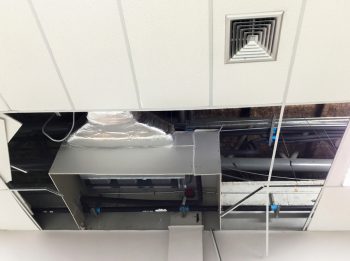
Commercial dishwashers are a mainstay in many businesses, from restaurants and bakeries to hotels and hospitals. They are designed to handle heavy-duty usage, cleaning large quantities of dishes and utensils quickly and efficiently. But how does a commercial dishwasher work? What makes it different from a residential dishwasher? And how can businesses ensure that their commercial dishwasher performs at its best? This comprehensive article will answer these questions and more.
A commercial dishwasher works by using a series of cycles: filling with water, washing the dishes with hot water and detergent, draining the dirty water, rinsing the dishes with clean, hot water, draining again, and finally drying the dishes. It’s designed with several key components like a water-holding tank, spray arms, racks, a conveyor system, and pumps, motors, and valves. The dishwasher’s temperature is crucial for ensuring food safety, sanitization, and regulatory compliance.
Structure and Design of a Commercial Dishwasher
A commercial dishwasher is not just a larger version of a residential model. It is a complex machine with several key components that work together to clean dishes and utensils. The main components include:
- Water-holding tank: This is where the water is stored and heated for the washing process.
- Spray arms: These spray hot water mixed with detergent at high speed onto the dishes.
- Racks: These hold the dishes in place during the washing process.
- Conveyor system (for conveyor-type dishwashers): This system moves the dishes through the wash chamber, where they are cleaned and sanitized.
- Pumps, motors, and valves: These components ensure the stability and proper functioning of the dishwasher during operation.
The Cleaning Process
The cleaning process in a commercial dishwasher is a series of cycles, each designed to perform a specific task. Here’s how it works:
- Filling: The dishwasher fills with water. The water is heated to a specific temperature, usually between 150-160°F for high-temperature dishwashers and 120-140°F for low-temperature models.
- Washing: The dishwasher sprays the dishes with hot water mixed with detergent. The water and detergent help break down and remove food particles and grease from the dishes.
- Draining: The dishwasher drains the dirty water and refills with clean water for the rinse cycle.
- Rinsing: The rinse water is heated to a higher temperature (usually around 180°F) to sanitize the dishes and remove any remaining detergent and food particles.
- Draining (again): The dishwasher drains the rinse water, and the drying process begins.
- Drying: Hot air is circulated to evaporate the remaining moisture on the dishes, or a heated drying element is used.
The Importance of Temperature
Maintaining the correct temperature in a commercial dishwasher is crucial for several reasons:
- Food safety: Proper temperature ensures that 99.999% of microorganisms are eliminated, reducing the risk of foodborne illnesses.
- Sanitization: High temperatures during the rinse cycle help sanitize dishes and utensils more effectively than chemical sanitizers, meeting the National Sanitation Foundation (NSF) regulations.
- Drying: Higher temperatures during the rinse cycle also help dishes dry faster, improving the overall efficiency of the dishwasher.
- Regulatory compliance: The FDA Food Code requires commercial dishwashers to achieve a utensil surface temperature of 71°C (160°F) for effective sanitization. Maintaining the correct temperature ensures compliance with these regulations.
Optimizing Water and Detergent Usage
Commercial dishwashers can consume a lot of water and detergent, especially when used frequently. However, modern models are designed to optimize water and detergent usage through various methods, including recycling water, using smart technology to monitor and analyze performance data, and using sensors to control water flow. Training kitchen staff to run the dishwasher only with full racks and to use the correct amount of detergent can also significantly reduce water and detergent waste.
Common Issues and Maintenance
Like any machine, commercial dishwashers can experience problems that can affect their functionality. Common issues include drainage problems, dirty dishes, residue on dishes, white or cloudy glasses, leaks, and low water pressure. Regular maintenance and prompt attention to any issues can help prevent these problems and ensure that the dishwasher operates at peak performance.
The Benefits of Using a Commercial Dishwasher
Using a commercial dishwasher offers several benefits over a residential model. These include lower labor costs, increased efficiency, improved sanitation, reduced breakages, compliance with regulations, and energy and water savings. With proper care and maintenance, a commercial dishwasher can be a valuable investment for any business.
In conclusion, a commercial dishwasher is a complex machine designed to clean large quantities of dishes and utensils quickly and efficiently. Understanding how it works can help businesses ensure that their dishwasher performs at its best, saving time, labor, and resources.
Frequently Asked Questions
How often should a commercial dishwasher be serviced?
Commercial dishwashers should be serviced at least once a year. However, depending on usage, it may be beneficial to schedule maintenance every six months to ensure optimal performance.
Can a commercial dishwasher be used in a residential setting?
While it is technically possible to use a commercial dishwasher in a residential setting, it’s generally not recommended. Commercial dishwashers are larger, noisier, and use more water and energy than residential models. They also require specific plumbing and electrical setups that may not be available in a typical home.
What are the different types of commercial dishwashers?
There are several types of commercial dishwashers including undercounter, door type, conveyor, and flight type. The type of dishwasher best suited for a business depends on the volume of dishes to be cleaned, available space, and budget.
How long does a wash cycle take in a commercial dishwasher?
A wash cycle in a commercial dishwasher typically takes between 1 to 4 minutes, depending on the type of dishwasher and the specific cycle setting. This is significantly faster than residential dishwashers, which can take anywhere from 1 to 3 hours to complete a cycle.
What is the life expectancy of a commercial dishwasher?
The life expectancy of a commercial dishwasher varies based on the model, usage, and maintenance. However, on average, a commercial dishwasher can last around 10 years with proper care and maintenance.












